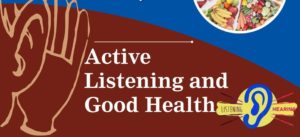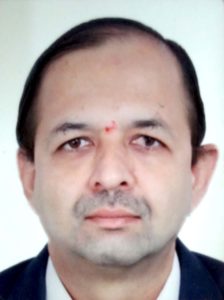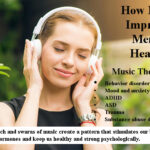How active listening makes a person healthier? Active listening is a common sense approach for gaining insights into issues that will help make a person healthier.
The word ‘listen’ contains the same letters as ‘silent’: Alfred Brendal.


Active listening: a two-way process
The internet information super highway has revolutionized knowledge. E-empowerment of the patient is a reality. Moreover, health websites are abuzz with health tips and recovery suggestions. Old grandma remedies are making a comeback on the strength of internet and social messaging tools. The doctor has to take all this into cognisance while delivering his prescription and therapy guidelines. E-savvy doctors too are leveraging on the internet medical knowledge platforms, and constantly improving their diagnosis and prescribing or therapy delivery skills. This is particularly so with the younger generation doctors.
The naiveté of the patient was particularly high in the pre-internet times. However, the modern day patient has to his advantage abundant knowledge on health issues at his fingertips, thanks to the smartphone penetration. On the medical side, it is not uncommon for doctors to get reports and case photos on whatsapp, and they provide remote diagnosis and suggestions to patients and peer – doctors. Modern technology has facilitated communication, broken the information divide and improved health outcomes, but somewhere the human touch may also be missing.
Thus, it is the era for medical professionals and patients to recast their listening attitude to incorporate a two – way process, ‘Active Listening’ – for good health! The concept of active listening was defined by the Conflict Research Consortium of University of Colorado, USA as: ‘a way of listening and responding to another person that improves mutual understanding’. So active listening implies the receiver of message shows positive response and is involved rather than being passive. Such a person seeks clarity, has responsive facial expressions such as nodding and talking in agreement, overall there is improved information flow from sender to recipient. Often, message senders do their job of providing the message regardless of whether the recipient has understood or not. This leads to several errors, including medical errors such as wrong intake of medicines.
For active listening to happen, listener should have interest, this shall translate into involvement and the listener will eventually remember the message. Ideally a doctor must elicit active listening from a patient despite the condition of patient, and the patient’s attender though anxious, must also provide attentive listening. The challenge in active listening is ensuring comprehension of the message. There are several barriers to this process. Bias or prejudice, language problem, defensiveness, memory failure and preconceived notions – all act as barriers to effective listening. Hence, trust is the key to good active listening.
Medical practitioners too now take great pains to practice active listening, since it gives clues to the patient’s status and lifestyle. This will enable providing the right therapeutic approach. Thus, successful doctors enquire about the diet, past allergies, vocation, habits, co-existing diseases, medicines or healthcare products currently consumed and other lifestyle factors of patients to provide a successful therapeutic recommendation. Several other doctors further emphasize points in their prescription and get a confirmation of the patient’s understanding of the instructions, to ensure safe and efficacious treatment. For example, taking medicines like antiulcerant pantoprazole on an empty stomach is vital for efficacy.
Practice of active listening is a good habit:


NGOs abroad run active campaigns such as LISTENING IS HELPING. This apparently innocuous skill to have active listening helps not only the recipient of the message, but also helps provide an emotional prop to the mentally stressed. Pharmacists are trained to offer an active listening ear, which improves health outcomes – particularly in the case of elderly.
Patient-centric communication by healthcare providers includes active listening. In this era of internet enabled learning, it is inevitable that there is high tech and high touch phenomena. Active listening by patients and healthcare practitioners will be a game changer approach, doctors stand to gain through goodwill, pharmacists will be seen as extremely helpful and patients themselves will gain valuable tips for their improved health. Active listening encourages people to talk beneficially. Active listening is a common sense approach for gaining insights into issues that will help make a person healthier.


Sunil S Chiplunkar
M Pharm (Pharmacology) MBA (Marketing) PGDHRM
VP-Business Development
Group Pharmaceuticals, Bengaluru.
Ph: 6364578669
sunilchiplunkar@gmail.com
www.pharmaceuticalshealthcare.blogspot.in











